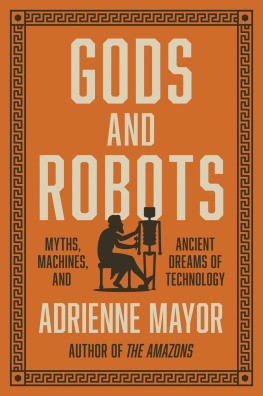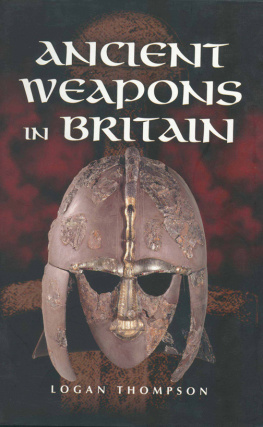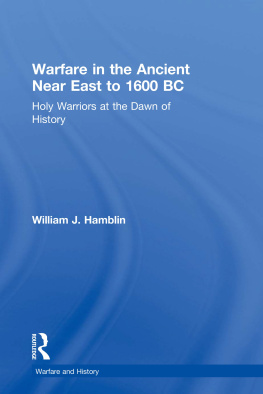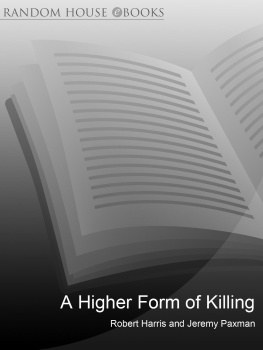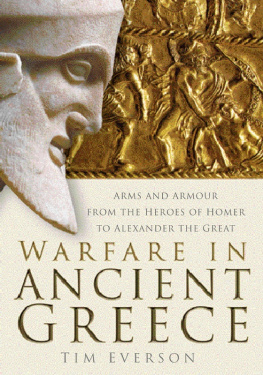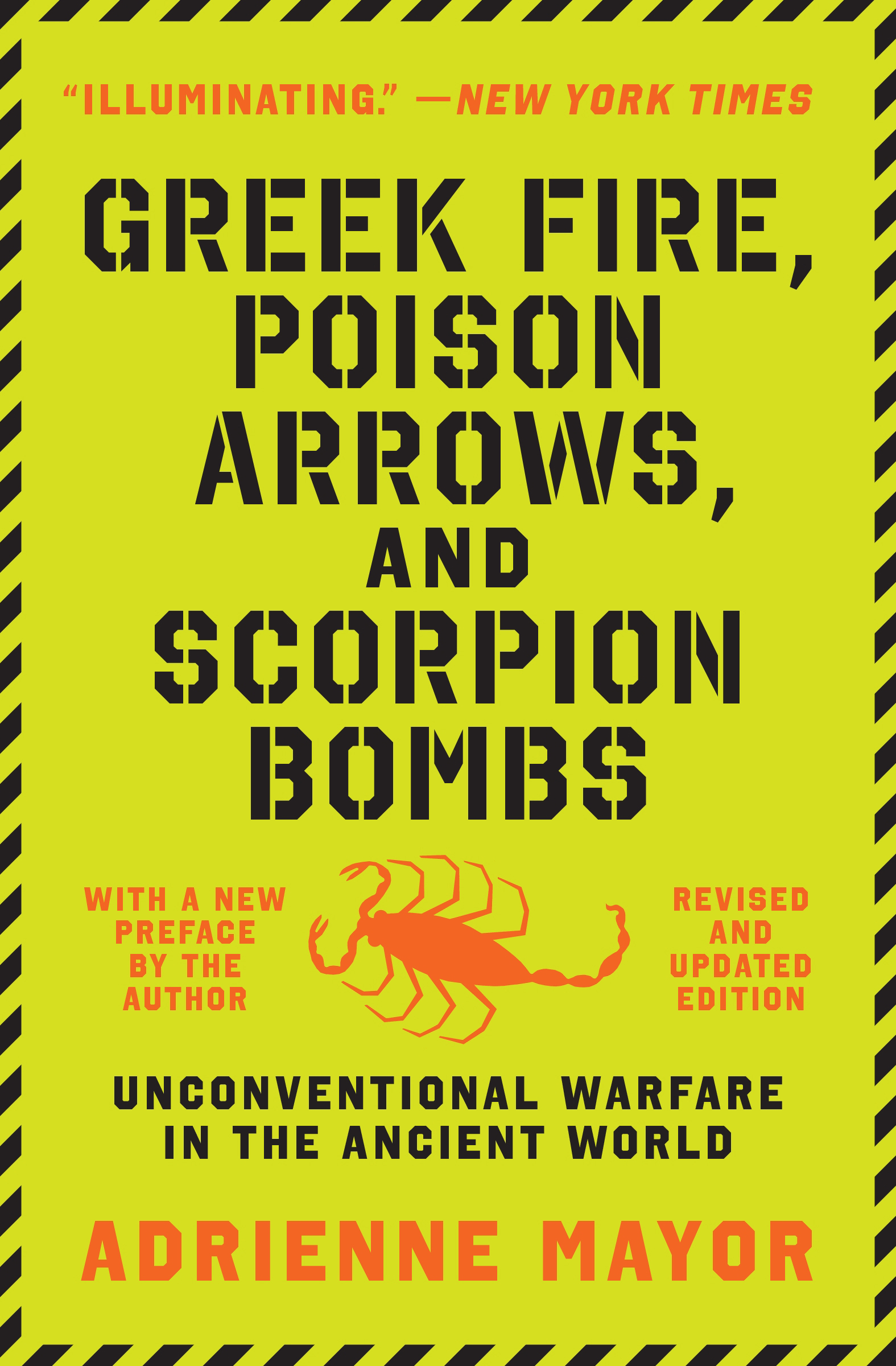MORE PRAISE FOR
GREEK FIRE, POISON ARROWS, AND SCORPION BOMBS
Illuminating. Excavates ancient attitudes toward biological and chemical arms that are startlingly relevant today. Mayor is comprehensive about the history, ethics, and science of early biological and chemical weapons.
JAY CURRIE,Christian Science Monitor
A gift for any writer of historical fiction and any student of human history. A fascinating and horrifying read.
DANA STABENOW, author of A Cold Day for Murder: A Kate Shugak Investigation
Recounts in lively, sometimes darkly comic detail the diabolical stratagems devised by devious warriors.
JOSEPH DAGNESE,Discover
This is the kind of book that should confound those who question whether the study of the ancient world has any relevance for the present day. Beautifully written.
RICHARD STONEMAN,Classical Review
Superbly researched.
STUART FLEMING,Expedition
Highly recommended.
ZYGMUNT DEMBEK,Naval War College Review
Mayor shows how the ancients reactions to biological weapons prefigure contemporary attitudes. [She] spices her astute commentary with diverse opinions about biological weapons.
Booklist
The books many strengths include discussion of how animals, flammables, and poisons were employed on the battlefield. Mayor does an excellent job of illuminating some fascinating and often overlooked methods, strategies, and events of ancient combat.
Library Journal
ABOUT THE AUTHOR

ADRIENNE MAYOR is the author of The Poison King: The Life and Legend of Mithradates, Romes Deadliest Enemy, which was a finalist for the National Book Award, Gods and Robots: Myths, Machines, and Ancient Dreams of Technology, and The Amazons: Lives and Legends of Warrior Women across the Ancient World (all Princeton). She is a research scholar in classics and the history of science at Stanford University.
GREEK FIRE, POISON ARROWS, AND SCORPION BOMBS

GREEK FIRE, POISON ARROWS, AND SCORPION BOMBS
UNCONVENTIONAL WARFARE IN THE ANCIENT WORLD
ADRIENNE MAYOR
PRINCETON UNIVERSITY PRESS
PRINCETON AND OXFORD
Copyright 2003, 2022 by Adrienne Mayor
Princeton University Press is committed to the protection of copyright and the intellectual property our authors entrust to us. Copyright promotes the progress and integrity of knowledge. Thank you for supporting free speech and the global exchange of ideas by purchasing an authorized edition of this book. If you wish to reproduce or distribute any part of it in any form, please obtain permission.
Requests for permission to reproduce material from this work should be sent to
Published by Princeton University Press
41 William Street, Princeton, New Jersey 08540
99 Banbury Road, Oxford OX2 6JX
press.princeton.edu
All Rights Reserved
Library of Congress Cataloging-in-Publication Data
Names: Mayor, Adrienne, 1946 author.
Title: Greek fire, poison arrows, and scorpion bombs : unconventional warfare in the ancient world / Adrienne Mayor.
Description: [Revised and updated edition] | Princeton : Princeton University Press, [2022] | Previous edition published by Overlook Press in 2003. | Includes bibliographical references and index.
Identifiers: LCCN 2021036196 (print) | LCCN 2021036197 (ebook) | ISBN 9780691217819 (hardback) | ISBN 9780691211084 (paperback) | ISBN 9780691211091 (ebook)
Subjects: LCSH: Biological weaponsHistoryTo 1500. | Chemical weaponsHistoryTo 1500. | Weapons, Ancient. | Military history, Ancient. | Military art and scienceRome.
Classification: LCC UG447.8 .M335 2022 (print) | LCC UG447.8 (ebook) | DDC 358/.38dc23
LC record available at https://lccn.loc.gov/2021036196
LC ebook record available at https://lccn.loc.gov/2021036197
Version 1.0
British Library Cataloging-in-Publication Data is available
Editorial: Rob Tempio and Chloe Coy
Production Editorial: Lauren Lepow
Text Design: Chris Ferrante
Cover Design: Chris Ferrante
Production: Erin Suydam
Publicity: Alyssa Sanford and Carmen Jimenez
FOR MICHELE AND MICHELLE
CONTENTS
- ix
- xxix
- xxxvii
PREFACE
I BEGAN THE REVISIONS and updating of this book while in lockdown in Palo Alto, California, during the worldwide coronavirus pandemic that began in early 2020. The massive mortality and the social, economic, and political upheavals around the globe rendered the subject even more sobering and timely than one would wish. For some, the rapid spread of the COVID-19 plague and the lack of preparation raised the disturbing realization that a devastating contagion could be used as a weapon. Indeed, rumors about the accidental leak of the coronavirus from two laboratories in Wuhan, China, where the outbreak originated, quickly developed into conspiracy theories, some based on assumptions of malicious intent.
Such fears are not new, as the chapters of this book demonstrate. When plague struck Athens in 430 BC during the Peloponnesian War, for example, the Athenians first impulse was to blame the Spartans. Fears of the deliberate transmission of plague arose in the Roman Empire, and in Europe during the Black Death. The havoc and mass deaths wrought by COVID-19 are sparking new, urgent concerns about bioweapons. The pandemic demonstrates the vulnerability of the world to new generations of biological threats. And the reality of genetic engineering biotechnologies combined with novel zoonotic contagions increases exponentially the potential impact of an attack.
The first edition of Greek Fire was begun during another crisis, just after the destruction of the World Trade Center in New York by the terrorist group al-Qaeda, led by Osama bin Laden, on September 11, 2001. That momentous event was followed by a series of anthrax attacks by unknown perpetrators. Media coverage of the day typically depicted biochemical warfare as a uniquely modern phenomenon. But I knew that biological and chemical warfare had deep and ancient roots. I had been studying unconventional warfare in antiquity since the 1990s.
Anxieties about bioterrorism, weapons of mass destruction (WMD) in the Middle East, and the unsolved anthrax attacks had everyone on edge. During preparations for President George W. Bushs invasion of Iraq in March 2003, it was assumed that Saddam Hussein would unleash germ and chemical weapons. Iraq had produced such armaments in the 1980s and 90s. In August 2003, US troops arrested Ali Hassan al-Majid, nicknamed Chemical Ali, responsible for fatally gassing five thousand Kurds in 1988. The fear of WMD necessitated cumbersome protective gear and novel vaccinations with dangerous side effects for the American soldiers.
Greek Fire, Poison Arrows, and Scorpion Bombs was originally published in October 2003, several months into the Iraq War. A macabre coincidence of a personal nature occurred three months later, when I underwent chemotherapy with a poison derived from yew trees, taxotere. From my research I knew that the tree was considered so deadly that Pliny the Elder had advised Romans to avoid even proximity to yews. Indeed, the ancient Romans poisoned arrows and spears with yew sap (). I found it grimly amusing to share this fact with my medical team.


